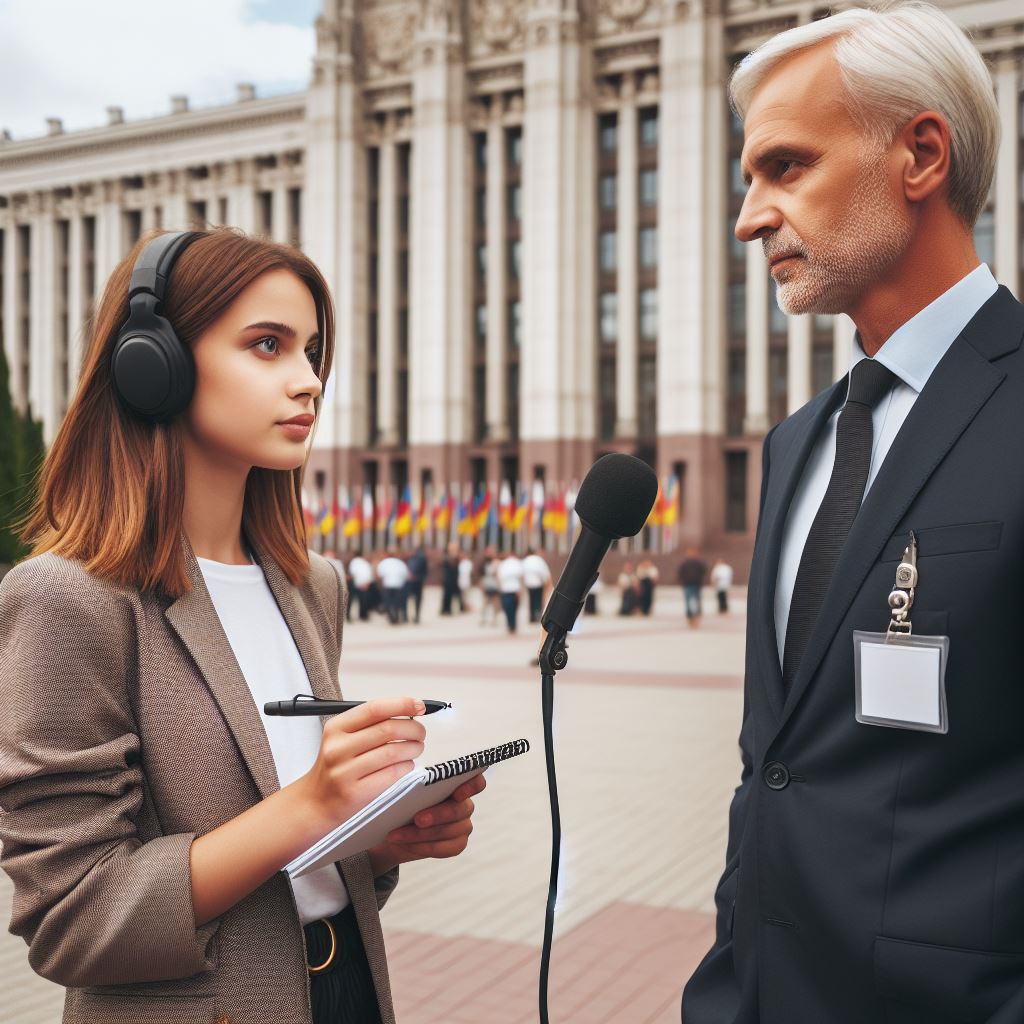Introduction
The Skill of Effective Communication
To excel in journalism, a journalist must be able to clearly communicate information in a concise and impactful manner.
The Art of Interviewing
Interviewing is a fundamental skill for journalists as it allows them to gather information directly from sources.
Research and Fact-Checking
Journalists must have the ability to conduct thorough research and verify facts to ensure the accuracy of their reporting.
Writing Skills
Strong writing skills are essential for journalists to convey their stories in a compelling and engaging manner.
Adaptability and Flexibility
Journalists often work in fast-paced and unpredictable environments, so the ability to adapt and think on their feet is crucial.
Digital Literacy
In today’s digital age, journalists must be proficient in using various digital tools and platforms for research, storytelling, and reaching wider audiences.
Ethical and Legal Knowledge
Journalists need to have a deep understanding of ethical guidelines and legal regulations to ensure responsible and accountable journalism.
Critical Thinking and Analytical Skills
Journalists must possess the ability to analyze complex situations, scrutinize information, and present objective perspectives.
Networking and Collaboration
Building strong relationships with sources and colleagues is crucial for journalists to gather information and collaborate on investigative reporting.
In short, the skills mentioned above are indispensable for every journalist in today’s media landscape.
By honing these skills, journalists can effectively inform and engage the public while upholding the integrity of their profession.
Strong Written Communication Skills
Importance of clear and concise writing in conveying information
Clear and concise writing is crucial for journalists to effectively communicate information to their audience.
In the fast-paced world of news, journalists must be able to convey complex ideas in a concise manner, ensuring that readers can easily understand and comprehend the message being conveyed.
Ability to adapt writing style for different platforms (print, online, social media)
In today’s digital age, journalists are required to adapt their writing style for different platforms.
Whether it’s writing articles for print publications, crafting engaging content for online platforms, or writing concise captions for social media posts, journalists must be versatile in their writing abilities to effectively engage with their audiences across various channels.
Understanding of grammar, spelling, and punctuation rules
A strong command of grammar, spelling, and punctuation rules is essential for journalists.
These skills ensure that their writing is accurate, professional, and credible.
Journalists need to pay close attention to details such as subject-verb agreement, proper spelling, and correct punctuation to maintain the integrity of their work.
Attention to detail for fact-checking and accuracy
Journalists have a responsibility to verify the information they report to ensure accuracy.
Attention to detail is crucial for fact-checking, as even the smallest inaccuracy can have significant consequences and damage the credibility of the journalist and the news outlet.
By being meticulous and thorough in their work, journalists can provide readers with reliable and trustworthy information.
Read:
Read: Art Festivals in Canada: A Must-Visit for Artists
Research and Investigative Skills
Conducting thorough research to gather information from multiple sources
- A journalist must be skilled at conducting thorough research to gather accurate information.
- It is important to collect information from multiple sources to ensure its reliability and accuracy.
- By gathering information from various sources, a journalist can provide a well-rounded perspective on a story.
- Research may involve internet searches, reading books or articles, and consulting experts in the field.
Ability to analyze and evaluate the reliability of sources
- Journalists must possess the ability to critically analyze and evaluate the credibility of their sources.
- This skill ensures that the information presented in a news article is accurate and trustworthy.
- Journalists need to cross-reference information and verify facts before including them in their stories.
- By evaluating the reliability of sources, journalists can maintain their integrity and deliver truthful news stories.
Interviewing skills to gather first-hand information and quotes
- Excellent interviewing skills are essential for journalists to gather first-hand information directly from the sources.
- Interviewing allows journalists to ask relevant questions and obtain exclusive insights for their stories.
- Journalists should listen actively, ask follow-up questions, and ensure the interviewee feels comfortable sharing information.
- Properly conducted interviews provide authentic quotes that add credibility and depth to a news article.
Knowledge of legal and ethical considerations in gathering information
- Journalists must be aware of the legal and ethical considerations when gathering information for their stories.
- They need to understand privacy laws, defamation laws, and other regulations that govern journalistic practices.
- Respecting individuals’ rights and seeking informed consent is crucial to maintain journalistic ethics.
- Knowledge of legal and ethical considerations ensures that journalists conduct their work responsibly and morally.
In essence, journalists require a range of research and investigative skills to gather accurate information, evaluate its reliability, conduct effective interviews, and navigate legal and ethical considerations.
Unlock Your Career Potential
Visualize a clear path to success with our tailored Career Consulting service. Personalized insights in just 1-3 days.
Get StartedBy honing these skills, journalists can fulfill their role of providing reliable news and informing the public.
Read: Art Festivals in Canada: A Must-Visit for Artists
Critical Thinking and Analytical Skills
Ability to critically analyze complex issues and present multiple perspectives
Journalists require the ability to analyze intricate matters and provide a comprehensive view of different angles.
Identifying bias and recognizing different types of propaganda
It is crucial for journalists to spot bias and be able to identify various forms of propaganda.
Making connections and drawing conclusions from various sources
Journalists should possess the ability to connect information from diverse sources and draw informed conclusions.
Remaining objective and not letting personal opinions interfere
To maintain credibility, journalists must remain unbiased and prevent personal opinions from affecting their reporting.
Critical thinking and analytical skills are indispensable for journalists to carry out their responsibilities effectively.
In order to provide accurate and unbiased information to the public, journalists must possess the ability to critically analyze complex issues and present multiple perspectives.
This allows them to offer readers a comprehensive view of the topic at hand. Identifying bias and recognizing different types of propaganda is another crucial skill for journalists.
With the proliferation of misinformation and the manipulation of facts, journalists must be able to spot bias in both their own work and the work of others.
This enables them to present information objectively and maintain the trust of their audience.
Journalists are often tasked with gathering information from various sources.
Therefore, making connections and drawing conclusions from these sources is paramount.
By synthesizing information from multiple sources, journalists can offer a more comprehensive understanding of the subject matter.
This skill also assists journalists in fact-checking and verifying information before reporting it.
One of the greatest challenges journalists face is remaining objective.
It is essential for journalists to separate their personal opinions from their reporting.
Objectivity ensures that journalists present information without bias, allowing readers to form their own judgments.
This skill requires self-awareness, discipline, and a commitment to the ethics of journalism.
To develop these critical thinking and analytical skills, journalists can engage in various practices.
First and foremost, they must continuously consume a wide range of news from different sources.
The exposure to diverse perspectives will help journalists understand different angles and foster unbiased thinking.
Read: Famous Canadian Artists: Past and Present Stories

Adaptability and Resilience
Adapting quickly to changes in the news landscape and technology advancements
- As a journalist, it is crucial to stay updated and informed about the ever-changing news landscape.
- Being adaptable and embracing technology advancements is necessary to thrive in the digital age.
- Journalists need to learn new tools and techniques to effectively gather, analyze, and present news.
- Adaptability also means being open to new story angles and being flexible in storytelling approaches.
- Embracing change allows journalists to cater to the evolving interests and preferences of their audience.
Working under pressure and tight deadlines
- Journalism often involves working under constant pressure and tight deadlines.
- Journalists must be able to work efficiently and effectively in time-sensitive situations.
- They need to remain calm and composed, even when faced with challenging circumstances.
- Working under pressure requires excellent organization, time management, and prioritization skills.
- Journalists should be able to deliver accurate and compelling stories within strict time constraints.
Handling criticism and negative feedback professionally
- Journalists are bound to face criticism and negative feedback at some point in their careers.
- It is essential to handle such feedback professionally and constructively.
- Listen to constructive criticism and use it as an opportunity for self-improvement.
- Responding to criticism gracefully, without being defensive, shows professionalism.
- Journalists should seek to understand different perspectives and engage in healthy, respectful dialogue.
Ability to multitask and manage various projects simultaneously
- In the fast-paced world of journalism, multitasking is often a necessity.
- Journalists must be adept at juggling multiple projects and assignments simultaneously.
- Prioritizing tasks and managing time efficiently are crucial skills for successful multitasking.
- Being organized and having excellent communication skills enable effective multitasking.
- Multitasking allows journalists to cover multiple stories and meet deadlines without compromising quality.
Adaptability and resilience are essential skills for journalists to thrive in the ever-changing media landscape.
The ability to adapt quickly to changes in technology and the news industry is paramount.
Journalists need to embrace new tools and techniques to effectively report and present news in the digital era.
Moreover, working under pressure and tight deadlines is a constant reality for journalists.
Being able to stay calm, organized, and deliver quality work within time constraints is crucial.
Criticism and negative feedback may also come along the journalist’s journey.
Handling criticism professionally, listening to feedback, and engaging in constructive dialogue is vital.
Finally, journalists often find themselves managing multiple projects simultaneously.
Multitasking requires excellent organizational and time management skills.
By mastering adaptability, resilience, and these accompanying skills, journalists can thrive in their profession.
Read: Creative Spaces: Top Canadian Art Studios to Know
Digital and Multimedia Skills
Familiarity with various digital tools and software for content creation
Journalists nowadays need to be familiar with a range of digital tools and software to create compelling content.
They should know how to use photo editing software, video editing software, and other content creation tools that can enhance the quality of their work.
Knowledge of web design and basic coding for online publishing
Having a basic understanding of web design and coding is crucial for journalists who want to publish their work online.
They should be able to navigate content management systems, customize layouts, and troubleshoot any technical issues that may arise.
Ability to create engaging multimedia content (videos, podcasts, infographics)
Journalists need to go beyond traditional text-based reporting and embrace multimedia formats.
They should know how to produce engaging videos, podcasts, and infographics that can capture and maintain the attention of their online audience.
Understanding of SEO principles for optimizing online content
To ensure their work reaches a wider audience, journalists need to understand search engine optimization (SEO) principles.
They should know how to use keywords effectively, write meta tags, and optimize their headlines and content for search engine visibility.
Interpersonal and Communication Skills
Building and maintaining relationships with sources and contacts
- Journalists must establish and nurture strong connections with their sources and contacts.
- Developing trust and rapport with these individuals is crucial for reliable information gathering.
- Regular communication and follow-ups are essential to maintain these relationships.
- By fostering these connections, journalists can gain access to exclusive news and insights.
- Building a network of reliable sources is a valuable asset in the field of journalism.
Active listening skills to understand others’ perspectives and gather information
- Active listening involves fully engaging with the speaker and focusing on the message.
- Journalists need to attentively listen to sources, interviewees, and other individuals involved.
- By carefully listening, journalists can grasp different perspectives and gather accurate information.
- Active listening helps journalists ask relevant follow-up questions and uncover valuable details.
- This skill enables journalists to present a well-rounded and comprehensive news story.
Ability to work collaboratively with a team of journalists or editors
- Collaboration is essential in the fast-paced world of journalism.
- Journalists often work in teams, dividing tasks and pooling resources to meet deadlines.
- Teamwork enables journalists to cover more ground and produce high-quality stories.
- Effective communication within the team fosters coordination and efficiency.
- Journalists need to respect each other’s contributions and embrace a cooperative work environment.
Excellent oral communication skills for conducting interviews or reporting live
- Journalists need exemplary oral communication skills to conduct successful interviews.
- Effective verbal communication allows journalists to ask clear and concise questions.
- Proper communication skills help journalists build a connection with their interviewees.
- Journalists must also communicate articulately while reporting live on air or in various media formats.
- Strong oral communication skills are instrumental in conveying information accurately and engagingly.
Enhancing interpersonal and communication skills is vital for journalists to excel in their field.
Building and maintaining relationships with sources and contacts build trust and lead to exclusive news.
Active listening enables journalists to understand perspectives and gather accurate information.
Collaborating effectively in teams ensures efficient and high-quality journalism.
Lastly, excellent oral communication skills are key for conducting successful interviews and reporting live.
By honing these skills, journalists can navigate the evolving media landscape and deliver impactful news stories.
Conclusion
Recap of the main skills discussed
- Effective communication: Journalists must have strong writing and verbal skills to convey information accurately.
- News gathering: Gathering reliable and relevant information is essential for journalists to produce credible stories.
- Adaptability: Journalists need to adapt to new technologies and platforms to stay relevant in the evolving media landscape.
- Investigative skills: The ability to uncover facts, interview sources, and analyze data is crucial for investigative journalism.
- Ethics and integrity: Journalists must uphold ethical standards to maintain credibility and public trust.
Emphasize the ongoing development and improvement of these skills for journalists:
In the fast-paced world of journalism, continuous learning and improvement of these skills are vital for success.
Closing thoughts on the significance of these skills in the ever-changing field of journalism:
As the field of journalism continues to evolve, these skills will remain essential for journalists in providing accurate and reliable news to the public.
Journalists must constantly adapt, learn, and improve to meet the demands of an ever-changing media landscape.




